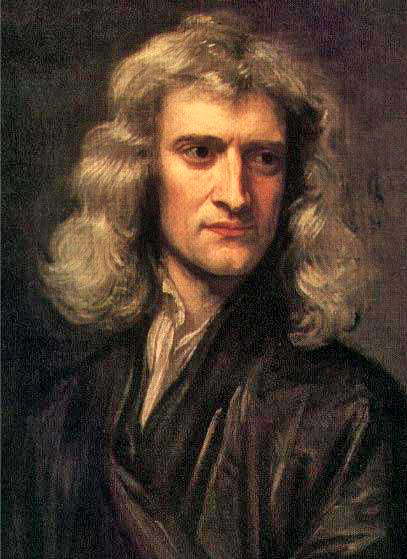Isaac Newton nejznámější citáty
Isaac Newton: Citáty o čase
Isaac Newton citáty a výroky

„Platón je můj přítel - Aristoteles je můj přítel - ale můj největší přítel je pravda.“
Amicus Plato — amicus Aristoteles — magis amica veritas
„Bůh stvořil vše podle čísla, váhy a míry.“
Numero pondere et mensura Deus omnia condidit.
„V Bibli existuje více důkazů autentičnosti, než bychom nalezli v jakýchkoli světských dějinách.“
Originál: (en) I find more sure marks of authenticity in the Bible than in any profane history whatsoever.
Zdroj: [Christie, Thomas, 1794, The Analytical Review, Or History of Literature, Domestic and Foreign, on an Enlarged Plan, Svazek 19, 491, angličtina]
„Dokážu spočítat pohyb nebeských těl, ale ne šílenství lidí.“
Originál: (en) I can calculate the motion of heavenly bodies, but not the madness of people.
Isaac Newton: Citáty anglicky
Query 21
Opticks (1704)
Reply upon being asked how he made his discoveries, as quoted in " Biographia Britannica: Or the Lives of the Most Eminent Persons who Have Flourished in Great Britain from the Earliest Ages Down to the Present Times, Volume 5 http://books.google.es/books?id=rYhDAAAAcAAJ&pg=PA3241&dq=I+keep+the+subject+constantly+before+me+and+wait+till+the+first+dawnings+open+little+by+little+into+the+full+light.&hl=es&sa=X&ei=ZBsMUpiLDpPU8wTEkYGAAQ&ved=0CEMQ6AEwAg#v=onepage&q=I%20keep%20the%20subject%20constantly%20before%20me%20and%20wait%20till%20the%20first%20dawnings%20open%20little%20by%20little%20into%20the%20full%20light.&f=false", by W. Innys, (1760), p. 3241.
Vol. I, Ch. 7: Of the Eleventh Horn of Daniel's Fourth Beast
Observations upon the Prophecies of Daniel, and the Apocalypse of St. John (1733)
“In default of any other proof, the thumb would convince me of the existence of a God.”
Reported as something said by Newton in Charles Dickens's All the Year Round https://books.google.es/books?id=bd0NAAAAQAAJ&q=%22the+thumb+would+convince+me+of+the+existence+of+a+God%22+dickens&dq=%22the+thumb+would+convince+me+of+the+existence+of+a+God%22+dickens&hl=es&sa=X&ei=fgHtVJ3BB4WXgwTAzoOwBA&ved=0CCAQ6AEwAA (1864), Vol. 10, p. 346; later found in " The Book of the Hand http://dds.crl.edu/loadStream.asp?iid=28101" (1867) by A R. Craig, S. Low and Marston, p. 51:
"In want of other proofs, the thumb would convince me of the existence of a God; as without the thumb the hand would be a defective and incomplete instrument, so without the moral will, logic, decision, faculties of which the thumb in different degrees offers the different signs, the most fertile and the most brilliant mind would only be a gift without worth."
A slight variant of this is cited as something Newton once "exclaimed" in Human Nature : An Interdisciplinary Biosocial Perspective http://books.google.es/books?id=c6O0AAAAIAAJ&q=In+the+absence+of+any+other+proof,+the+thumb+alone+would+convince+me+of+God's+existence.&dq=In+the+absence+of+any+other+proof,+the+thumb+alone+would+convince+me+of+God's+existence.&hl=es&sa=X&ei=KAkMUuLjL-am2gWtnoHgDg&ved=0CFUQ6AEwBQ, Vol. 1, Issues 7-12 (1978), p. 47: "In the absence of any other proof, the thumb alone would convince me of God's existence."
Query 5
Opticks (1704)
Letter to Ignatius Pardies (1672) Philosophical Transactions of the Royal Society (Feb. 1671/2) as quoted by William L. Harper, Isaac Newton's Scientific Method: Turning Data Into Evidence about Gravity and Cosmology (2011)
Query 31
Opticks (1704)
Query 4
Opticks (1704)
Vol. I, Ch. 11: Of the Times of the Birth and Passion of Christ
Observations upon the Prophecies of Daniel, and the Apocalypse of St. John (1733)
Query 1
Opticks (1704)
Preface
Philosophiae Naturalis Principia Mathematica (1687)
Drafts on the history of the Church (Section 3). Yahuda Ms. 15.3, National Library of Israel, Jerusalem, Israel. 2006 Online Version at Newton Project http://www.newtonproject.sussex.ac.uk/view/texts/normalized/THEM00220
Vol. I, Ch. 13: Of the King who did according to his will, and magnified himself above every God, and honored Mahuzzims, and regarded not the desire of women
Observations upon the Prophecies of Daniel, and the Apocalypse of St. John (1733)
"Hypothesis explaining the Properties of Light" (1675)
Vol. I, Ch. 13: Of the King who did according to his will, and magnified himself above every God, and honored Mahuzzims, and regarded not the desire of women
Observations upon the Prophecies of Daniel, and the Apocalypse of St. John (1733)
“Oh, Diamond! Diamond! thou little knowest what mischief thou hast done!”
This is from an anecdote found in St. Nicholas magazine, Vol. 5, No. 4, (February 1878) http://www.gutenberg.org/files/15331/15331-h/15331-h.htm :
Sir Isaac Newton had on his table a pile of papers upon which were written calculations that had taken him twenty years to make. One evening, he left the room for a few minutes, and when he came back he found that his little dog "Diamond" had overturned a candle and set fire to the precious papers, of which nothing was left but a heap of ashes.
"Hypothesis explaining the Properties of Light" (1675)
Four Letters to Bentley (1692) first letter
Vol. I, Ch. 12: Of the Prophecy of the Scripture of Truth
Observations upon the Prophecies of Daniel, and the Apocalypse of St. John (1733)
“If I had stayed for other people to make my tools and things for me, I had never made anything.”
This first appears in the Isaac Newton : A Biography (1934), citing unpublished papers by John Conduitt reporting an anecdote of an occassion where Conduitt asked Newton where he obtained the tools to make his reflecting telescope. Newton is said to have laughed and replied, "If I had stayed for other people to make my tools and things for me I had never made anything of it."
Disputed
Isaac Newton, cited in The Watchtower magazine, 1977, 4/15.
Laws of Motion, I
Philosophiae Naturalis Principia Mathematica (1687)
Query 13
Opticks (1704)
“Whence are you certain that ye Ancient of Days is Christ? Does Christ anywhere sit upon ye Throne?”
He wrote in discussing with John Locke the passage of Daniel 7:9. The Correspondence of Isaac Newton, Vol. III, Letter 362. Cited in The Watchtower magazine, 1977, 4/15, article: Isaac Newton’s Search for God.
Vol. I, Ch. 8: Of the power of the eleventh horn of Daniel's fourth Beast, to change times and laws
Observations upon the Prophecies of Daniel, and the Apocalypse of St. John (1733)
Query 21
Opticks (1704)
“God created everything by number, weight and measure.”
Numero pondere et mensura Deus omnia condidit.
As quoted in Symmetry in Plants (1998) by Roger V. Jean and Denis Barabé, p. xxxvii, a translation of a Latin phrase he wrote in a student's notebook, elsewhere given as Numero pondere et mensura Deus omnia condidit. This is similar to Latin statements by Thomas Aquinas, and even more ancient statements of the Greek philosopher Pythagoras. See also Wisdom of Solomon 11:20 https://en.wikisource.org/wiki/Bible_(King_James)/Wisdom_of_Solomon#Chapter_11
Query 20
Opticks (1704)
Of Idolatry
A short Schem of the true Religion

